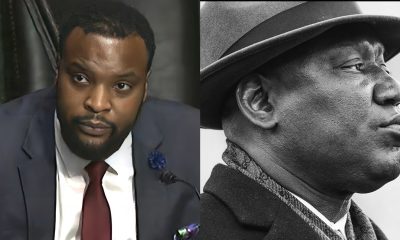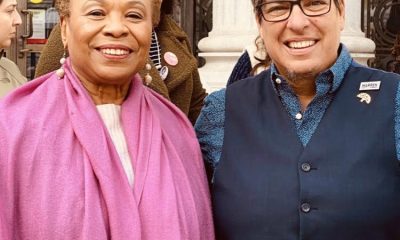National
Ferguson Mulls Removing Brown Shrine from Middle of Street

A car passes two makeshift memorials to Michael Brown Tuesday, May 5, 2015, near where the unarmed, black 18-year-old was shot and killed last August by white Ferguson, Missouri, Police Officer Darren Wilson. (AP Photo/Jim Salter).
Jim Suhr and Alan Scher Zagier, ASSOCIATED PRESS
FERGUSON, Mo. (AP) — To some, a makeshift shrine in the middle of the Ferguson street where Michael Brown was killed last summer is a hallowed symbol of a new civil rights movement over race and policing. To others, it has served its purpose and is now more of an eyesore and a road hazard.
Within hours of Brown’s Aug. 9 shooting death by a white police officer, people began placing stuffed animals, candles and other tributes in the middle of Canfield Drive, where the unarmed black 18-year-old’s body lay for about four hours before it was removed.
The shrine stretches several yards down the center of the two-lane road that bisects a housing complex, and city leaders are grappling with the thorny question of whether to remove or replace it and risk further inflaming racial tensions in the 21,000-resident St. Louis suburb, which is two-thirds black. Another section of the shrine sits along the curb a few yards away.
“It’s a very sensitive topic,” says Janie Jones, a black, Washington-based mediator who says she has been working behind the scenes with Ferguson municipal leaders and the Brown family on how to clear out the memorial without agitating the black community.
“It represents a community’s cry for justice — not just for Michael Brown, but for people all over the world,” Jones told The Associated Press on Monday. “The city has some serious decisions to make going forward.”
Brown’s killing by Officer Darren Wilson, who left Ferguson’s police force after a grand jury decided not to charge him, touched off weeks of sometimes-violent demonstrations and a national “Black Lives Matter” movement that only gained momentum with the subsequent police killings of unarmed black men in other U.S. cities.
Although Wilson wasn’t charged, the U.S. Justice Department released a scathing report citing racial bias and racial profiling in the Ferguson Police Department and in a profit-driven municipal court system that frequently targeted blacks.
Ferguson Mayor James Knowles III, while appreciative of the memorial’s status as a nexus of protests and prayers, said it is now a public safety issue that comes with “any time you leave items in the middle of the roadway.” Knowles, who is white, pointed to last Christmas Day, when an unidentified motorist — whether intentionally or accidentally — plowed through the shrine. Neighbors and Brown supporters swiftly cleaned up the damage and rebuilt the site.
Now, Knowles said, “the city would like it moved,” adding that “we’re working on getting a buy-in with the family and community” to make it happen. He said no decisions have been made and there isn’t a deadline to decide the matter.
During a Ferguson City Council meeting last month — the first since city elections tripled black representation on the governing board that had been largely white — Jones proposed replacing the shrine with a permanent dove-shaped marker embedded in the street.
That would “take a very tragic situation and use it as a teachable moment to encourage community healing and symbolize the unity that is very much needed,” said Jones, president and CEO of the Joint Council on Policy and Social Impact. “The way we deal with this memorial is how we move forward in Ferguson, because that memorial represents the best and the worst of Ferguson.”
Jones said Brown’s mother wants a portion of the road where the memorial rests carved out and repaved because “she feels like her son’s blood is still in the streets.”
Jeff Small, a Ferguson city spokesman, said discussions about the memorial’s fate likely would go the city’s traffic commission comprised of various Ferguson residents and newly elected Councilwoman Ella Jones, who did not return telephone messages seeking comment for this story.
The Brown family’s attorney, Benjamin Crump, also did not reply to messages seeking comment.
Debate about the memorial’s fate comes as Brown’s parents are pressing a wrongful-death lawsuit against the city of Ferguson, Wilson and the former police chief. Dorian Johnson, who was with Brown at the time of the shooting, also sued those same parties last week, accusing Wilson of being the aggressor who used excessive force and “acted with deliberate indifference or with reckless disregard” for Johnson’s rights.
___
Follow Alan Scher Zagier on Twitter at https://twitter.com/azagier.
Copyright 2015 The Associated Press. All rights reserved. This material may not be published, broadcast, rewritten or redistributed.
###
Activism
Oakland Post: Week of April 17 – 23, 2024
The printed Weekly Edition of the Oakland Post: Week of April 17 – 23, 2024

To enlarge your view of this issue, use the slider, magnifying glass icon or full page icon in the lower right corner of the browser window. ![]()
Barbara Lee
Congresswoman Barbara Lee Issues Statement on Deaths of Humanitarian Aid Volunteers in Gaza
On April 2, a day after an Israeli airstrike erroneously killed seven employees of World Central Kitchen (WCK), a humanitarian organization delivering aid in the Gaza Strip, a statement was release by Rep. Barbara Lee (D-CA-12). “This is a devastating and avoidable tragedy. My prayers go to the families and loved ones of the selfless members of the World Central Kitchen team whose lives were lost,” said Lee.

By California Black Media
On April 2, a day after an Israeli airstrike erroneously killed seven employees of World Central Kitchen (WCK), a humanitarian organization delivering aid in the Gaza Strip, a statement was release by Rep. Barbara Lee (D-CA-12).
“This is a devastating and avoidable tragedy. My prayers go to the families and loved ones of the selfless members of the World Central Kitchen team whose lives were lost,” said Lee.
The same day, it was confirmed by the organization that the humanitarian aid volunteers were killed in a strike carried out by Israel Defense Forces (IDF). Prior to the incident, members of the team had been travelling in two armored vehicles marked with the WCF logo and they had been coordinating their movements with the IDF. The group had successfully delivered 10 tons of humanitarian food in a deconflicted zone when its convoy was struck.
“This is not only an attack against WCK. This is an attack on humanitarian organizations showing up in the direst situations where food is being used as a weapon of war. This is unforgivable,” said Erin Gore, chief executive officer of World Central Kitchen.
The seven victims included a U.S. citizen as well as others from Australia, Poland, the United Kingdom, Canada, and Palestine.
Lee has been a vocal advocate for a ceasefire in Gaza and has supported actions by President Joe Biden to airdrop humanitarian aid in the area.
“Far too many civilians have lost their lives as a result of Benjamin Netanyahu’s reprehensible military offensive. The U.S. must join with our allies and demand an immediate, permanent ceasefire – it’s long overdue,” Lee said.
Commentary
Commentary: Republican Votes Are Threatening American Democracy
In many ways, it was great that the Iowa Caucuses were on the same day as Martin Luther King Jr. Day. We needed to know the blunt truth. The takeaway message after the Iowa Caucuses where Donald Trump finished more than 30 points in front of Florida Gov. De Santis and former South Carolina Governor Nikki Haley boils down to this: Our democracy is threatened, for real.

By Emil Guillermo
In many ways, it was great that the Iowa Caucuses were on the same day as Martin Luther King Jr. Day.
We needed to know the blunt truth.
The takeaway message after the Iowa Caucuses where Donald Trump finished more than 30 points in front of Florida Gov. De Santis and former South Carolina Governor Nikki Haley boils down to this: Our democracy is threatened, for real.
And to save it will require all hands on deck.
It was strange for Iowans to caucus on MLK day. It had a self-cancelling effect. The day that honored America’s civil rights and anti-discrimination hero was negated by evening.
That’s when one of the least diverse states in the nation let the world know that white Americans absolutely love Donald Trump. No ifs, ands or buts.
No man is above the law? To the majority of his supporters, it seems Trump is.
It’s an anti-democracy loyalty that has spread like a political virus.
No matter what he does, Trump’s their guy. Trump received 51% of caucus-goers votes to beat Florida Gov. Ron DeSantis, who garnered 21.2%, and former South Carolina Gov. Nikki Haley, who got 19.1%.
The Asian flash in the pan Vivek Ramaswamy finished way behind and dropped out. Perhaps to get in the VP line. Don’t count on it.
According to CNN’s entrance polls, when caucus-goers were asked if they were a part of the “MAGA movement,” nearly half — 46% — said yes. More revealing: “Do you think Biden legitimately won in 2020?”
Only 29% said “yes.”
That means an overwhelming 66% said “no,” thus showing the deep roots in Iowa of the “Big Lie,” the belief in a falsehood that Trump was a victim of election theft.
Even more revealing and posing a direct threat to our democracy was the question of whether Trump was fit for the presidency, even if convicted of a crime.
Sixty-five percent said “yes.”
Who says that about anyone of color indicted on 91 criminal felony counts?
Would a BIPOC executive found liable for business fraud in civil court be given a pass?
How about a BIPOC person found liable for sexual assault?
Iowans have debased the phrase, “no man is above the law.” It’s a mindset that would vote in an American dictatorship.
Compare Iowa with voters in Asia last weekend. Taiwan rejected threats from authoritarian Beijing and elected pro-democracy Taiwanese vice president Lai Ching-te as its new president.
Meanwhile, in our country, which supposedly knows a thing or two about democracy, the Iowa caucuses show how Americans feel about authoritarianism.
Some Americans actually like it even more than the Constitution allows.
About the Author
Emil Guillermo is a journalist and commentator. He does a mini-talk show on YouTube.com/@emilamok1.
-

 Activism4 weeks ago
Activism4 weeks agoOakland Post: Week of March 27 – April 2, 2024
-

 #NNPA BlackPress4 weeks ago
#NNPA BlackPress4 weeks agoCOMMENTARY: D.C. Crime Bill Fails to Address Root Causes of Violence and Incarceration
-

 #NNPA BlackPress4 weeks ago
#NNPA BlackPress4 weeks agoFrom Raids to Revelations: The Dark Turn in Sean ‘Diddy’ Combs’ Saga
-

 #NNPA BlackPress4 weeks ago
#NNPA BlackPress4 weeks agoCOMMENTARY: Lady Day and The Lights!
-

 #NNPA BlackPress4 weeks ago
#NNPA BlackPress4 weeks agoMayor, City Council President React to May 31 Closing of Birmingham-Southern College
-

 #NNPA BlackPress4 weeks ago
#NNPA BlackPress4 weeks agoBaltimore Key Bridge Catastrophe: A City’s Heartbreak and a Nation’s Alarm
-

 #NNPA BlackPress4 weeks ago
#NNPA BlackPress4 weeks agoBaltimore’s Key Bridge Struck by Ship, Collapses into Water
-

 #NNPA BlackPress4 weeks ago
#NNPA BlackPress4 weeks agoBeloved Actor and Activist Louis Cameron Gossett Jr. Dies at 87



















































